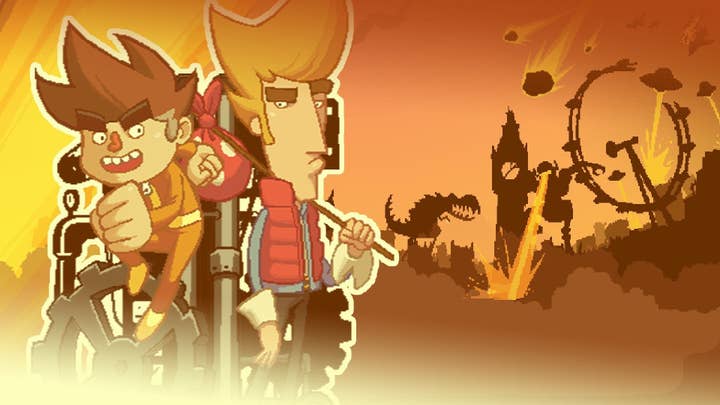Harnessing the power of positive reviews
How Steam's review system helped Size Five Games' Dan Marshall to sell Lair of the Clockwork God
You hear that? That's the sound of an amazing tree falling over in a forest and no one finding out about it.
A tragedy, really, because it was such an awe-inspiring tree. I really enjoyed the way it gracefully arced towards the ground with a satisfying "plumfh" noise, and it was visually spectacular, unlike any tree I've ever seen before. But I haven't told any other people about what I saw, so it might as well not have happened.
I'm a longtime indie. I've been doing this since about 2006, and positive Steam reviews has never been more important to developers like you and I. It's a storm we all have to weather.
When Lair of the Clockwork God first launched, I was blown away by the onslaught of positive reviews we were getting. I'd expected the usual 10% of people not "getting it", but somehow, miraculously, that didn't really happen. Looking back, I've realised a few things about how we achieved this.
Lair of the Clockwork God's credits end with a call to action to leave a review
This is going to sound dumb and obvious, but I suppose the critical point for getting strong Steam reviews was that we'd made a good game. It had been cooking in the oven for a long time, and we'd released it only when it was finished. It was, bar one or two (okay ten) exceptions, bug-free. It was well-written and funny, and I'm happy saying it is continually inventive and interesting.
It's a good game. I launched it with a high degree of confidence that people would like it, and as a creative that's not something I say with ease. As a result, in the weeks after launch we had a deluge of constant positive reviews.
Fired up by that, every day in the first three months after launch, I sent out tweets to my 40,000 Twitter followers, reminding people who have played the game to please leave a review. That sort of incessant annoyance cost me half a thousand followers, but it did remind our fans to be outwardly vocal about the things they love. I'm happy that all of our reviews are honest and legitimate, but people just need a poke to remind them to do it.

We all do. We all play something and go "aaah, that was awesome" and in a hop, skip and a jump we're off to PornHub and the moment is forgotten about. Gently reminding players to wipe themselves down, log back in and share their thoughts would normally cause a few new reviews to come in -- usually ones with between ten and 13 hours playtime, so people who had likely completed the game.
What's more, Lair of the Clockwork God's credits end with a call to action to leave a review. Those people -- who got to the end -- are the ones you want writing your reviews, because presumably they really enjoyed the game.
In practical terms, where did these positive reviews get us? Despite the odd one or two -- literally two, at the time of writing -- dissenting voices, Lair of the Clockwork God currently has a 99.4% approval rating on Steam. That was enough to make us the top-rated Hidden Gem game on the platform for three months, and the 507th best game on Steam -- like, ever. I think that's pretty impressive. It draws more eyeballs in, which means more sales, and more reviews.
In those early days of marketing, where my time was spent endlessly emailing sites begging for reviews and coverage, have you got any idea how helpful it was to be able to just plonk a link to Steam and say "have a read of the reviews"? In a time where there are so many indie games that websites can't possibly keep up with them all, having a barrage of positivity on the game's store page was a foot in the door, a selling point, and a real eye opener.
When I was talking to Nintendo about the game, I had the wealth of user reviews behind me. It gave me strength
I like to think that game sites want to come across as hip to the latest trends, that they're in touch with the latest goings-on. I was definitely able to snag more coverage for the game based on the unusually strong user feedback we were getting.
In impractical terms, I can't express how much it does for morale to see the sweeping majority of people raving about your game. I can't tell you how it made all the pain and suffering of those long winters nights fixing bugs and screaming helplessly at a confused monitor all worthwhile. I can't tell you how logging onto the store page and seeing half-a-dozen new, glowing reviews sends me to bed with a smile in my heart and raring to go the next day. It's an intangible, wispy benefit, but each positive review is a little boost to my sense of self-esteem, a little virtual hug and a "well done" from a stranger.
When the possibility of a Switch port came up and I was talking to Nintendo about the game, I had the wealth of user reviews behind me. It gave me strength. It gave me the power to sit confidently on a Zoom call and say "this is a game you should be paying attention to", and I didn't need to worry that deep down I was secretly bullshitting, because the people had spoken. I was right. It is a good game. It is worth paying attention to.
Then there's the Dark Arts: algorithms. Now, I've been told in no uncertain terms that Steam's algorithm pays no attention to the positive/negative rating a game has -- but come on. Surely it does, doesn't it? We can't ever know for sure, but there was certainly a correlation with Lair of the Clockwork God -- after a random burst of half-a-dozen new reviews, sales were up in the days immediately after. Probably serendipitous, but I've stared at the correlating figures a number of times and sniffed the air with a certain suspicion, that a mere handful of new reviews had meant the game was being shown in more places around the Steam store.
Look, this is pretty obvious, but if you've played a game on Steam and you enjoyed it, leave a Recommended review -- yes, even as a developer yourself. I like to think deep down we're actually all just people, too. It takes mere seconds, it's free, and at the very least you're going to put a huge smile on some other tired developer's face.
In the unholy shit-storm that is 2020 it's an astonishingly simple way of spreading a little love, and I think we could all do with a bit more of that.
